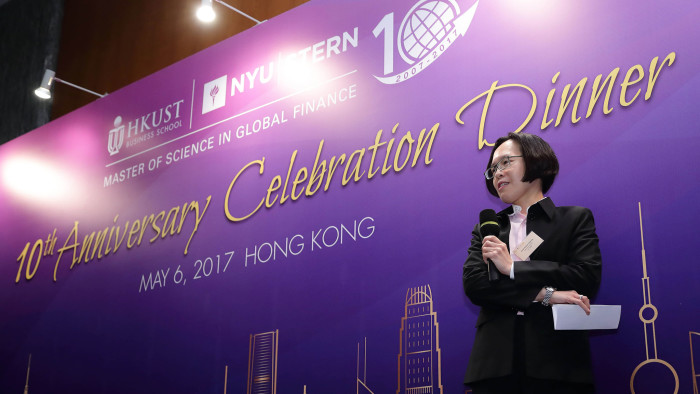Business school where real-life crises provide valuable lessons

Roula Khalaf, Editor of the FT, selects her favourite stories in this weekly newsletter.
It is not unusual for the opening sessions of executive finance courses to focus on markets and the role of banks as intermediaries. However, real events helped to underpin dramatically what was being taught to students during one Master of Science in Global Finance programme when it was launched 10 years ago.
“It was clear that the role of the intermediary was not what it used to be, not just taking deposits and lending,” says Charmaine Cheuk, a real estate investment executive who was a student on the first MSc in Global Finance course run jointly by New York University’s Stern School of Business and the Hong Kong University of Science and Technology (HKUST) Business School in 2007.
Hong Kong-born Ms Cheuk says she realised that she was watching a revolution take place as the 2008 financial crisis developed and the role of complex products such as subprime loans and collateralised debt obligations — which played a big part in the meltdown — became more obvious.
Ms Cheuk, who began her career in San Francisco, had just moved back to Hong Kong after studying and working in the US and Japan when she started the part-time executive education programme. “The fact that it was on the weekend made it easier to manage,” she says.
With hindsight, it seems that 2007 was an opportune moment to inaugurate a course that is focused on the global financial system. By March 2008, investment bank Bear Stearns’ stock was in freefall and it later failed.
The same year, AIG, the insurer, was bailed out by the US government and Lehman Brothers, the investment bank, filed for Chapter 11 bankruptcy protection.
For Menachem Brenner, co-academic director of the programme, the crisis sharpened his ambitions for the programme. He had been teaching on the course but became its director just as the crisis erupted. “It had so many lessons for us worldwide,” he says. “And one of the things I saw as a mission was to bring into the programme those lessons drawn from the crisis.”
Ms Cheuk remembers how the daily events added an unexpected dimension to her studies. “It was exciting. It was not just textbook in terms of what you were studying, it was literally in front of you every day.”
The financial crisis has not been the only systemic shock that has influenced the course’s development. Kasper Meisner Nielsen, associate professor at HKUST and the programme’s academic director, cites China’s 2015 stock market turbulence and Britain’s impending departure from the EU as other examples. “It’s been an interesting time in which to build a global finance programme,” he says.
The constant flux in the financial world has meant the content needs to be regularly updated. For example, two courses have recently been added, one in fintech and the other in behavioural finance, which combines behavioural and cognitive psychological theory with conventional economics and finance. The latter course has been able to draw on recent Chinese stock volatility to examine financial markets through a psychological lens.
“The financial market experience in China, with the recent crash in stock prices, is a great illustration of where we have a hard time as economists describing market behaviour using rational modelling,” says Prof Nielsen.
However, Prof Nielsen admits that academia can be slow to keep pace with the real world. “It takes a bit of time to catch up with the latest changes because we don’t want to offer a new course without a lot of substance,” he says.
Shifts in global capital markets have influenced the programme in other ways. The China-based component of the course used to take place in Beijing but last year it moved to Shanghai, partly because New York University has a campus in the city but also to reflect Shanghai’s growth as a financial centre.

If students have been able to learn from watching the upheavals in the global financial system, they have also benefited from the international profile of their fellow students and the networks they build. “We still see each other regularly and have dinners when people come into town,” says Ms Cheuk of her old classmates. They also have get-togethers to mark special occasions. In April, 75 students, faculty and alumni gathered at Stern to mark the course’s 10th anniversary. A second event took place in Hong Kong in May.
Most students in the first intake were from Asia. Just one, who was working for a company based in Shenzhen, was from the US. Now almost 40 per cent of the intake comes from outside Asia. In total there are 17 nationalities in the current cohort, including people from Lebanon and Nigeria.
More recent students include New York-based Nick Adams, who completes his MSc later this year. He already had an MBA from Northeastern university but sought deeper financial knowledge as he wanted to move from software to venture capital. Mr Adams says the course was “a great way to expand your experience, education and get you to think in a different way”. Through classmates and alumni connections he secured a position with Flatiron Investors, where he now works on new deals with companies seeking funding.
The current course is structured in modules, with students taking four in Hong Kong, two in New York and one in Shanghai. “There’s a lot of jet lag, but it tells us we have a programme that is successful when people are prepared to get on a plane,” says Prof Nielsen.
Prof Brenner adds that the variety of study locations and the opportunity to travel increases the programme’s appeal. “In both New York City and Hong Kong you have a feeling that the whole world comes together.”
Comments